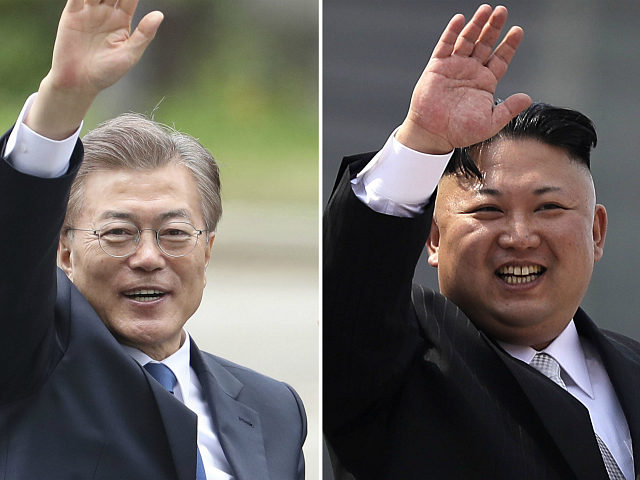North Korean dictator Kim Jong-un has agreed to meet South Korean President Moon Jae-in on April 27 in Panmunjom, a village on the border of both nations that belongs to neither.
Panmunjom’s “Peace House,” a building designated a neutral meeting ground for government officials of both Koreas, will host what will be the third inter-Korean summit in the history of the Korean split and the first in-person meeting between Kim and Moon.
As of this week, when Kim made a surprise visit to Chinese communist leader Xi Jinping in Beijing, this meeting will be the second between Kim and another head of state since he became the nation’s dictator in 2011, following the death of his father Kim Jong-il. It will also be the first summit between the two nations since 2007; the first occurred in 2000, half a century after the start of the Korean War.
Kim is also still expected to meet U.S. President Donald Trump for their first in-person summit at a to-be-determined date before the end of May.
The Peace House is located on the South Korea side of Panmunjom, making this meeting the first-ever visit to South Korea by a North Korean dictator.
Seoul confirmed that high-level officials from both countries would meet to finalize details of the Kim-Moon summit on Monday.
The South Korean newswire service Yonhap reports that the two Koreas issued a joint statement confirming the time and place for the meeting following high-level talks featuring the head of the South Korean Unification Ministry. They noted that another inter-Korean meeting was scheduled for next Wednesday to plan the logistics of that meeting.
Minister Cho Myoung-gyon issued his own remarks, celebrating “another start of a great journey to denuclearize the Korean Peninsula, bring peace to the peninsula and develop inter-Korean ties.” Cho told reporters that the desired items on the docket to discuss for both world leaders were “not too different,” both allegedly seeking to discuss denuclearization and the establishment of what Cho called a “peace regime,” according to the South Korean Joongang Daily newspaper.
Chairman of the Committee of the Peaceful Reunification of the Country of the Democratic People’s Republic of Korea Ri Son-gwon led his nation’s delegation. The name of the agency highlights North Korea’s stance on the south as a renegade province of the communist regime, not a sovereign nation. North Korean media do not capitalize “south” when discussing South Korea.
“There’s only a month left before the North-South summit,” Ri told South Korean delegates to the meeting, “and during this short period, there are many things to discuss at the working-level. But if both sides keep deeply aware of the historic significance and importance of the summit meeting, and work hard with prudence and a cooperative attitude, we will be able to discuss and resolve every issue swiftly and smoothly.”
South Korean officials applauded the meeting that Kim held with Xi in Beijing this week. That meeting, which both sides only confirmed when Kim had safely returned to Pyongyang, featured a lavish banquet for Kim and resulted in effusively positive coverage from both the Chinese and North Korean communist propaganda outlets. Xi reportedly told Kim that the bilateral relationship was strong because of generations of relying on each other and that “this should not and will not change because of any single event at a particular time,” a sign that the Chinese are growing concerned that their role in containing North Korea is being eclipsed by Seoul and Washington.
Kim subdued those anxieties by reportedly assuring Xi that their meeting “will yield abundant fruits of DPRK-China friendship, and facilitate peace and stability on the Korean Peninsula.”
Kim also reportedly said, “It is our consistent stand to be committed to denuclearization on the peninsula, in accordance with the will of late President Kim Il Sung and late General Secretary Kim Jong Il,” according to reports in Chinese media.
North Korean media did not report that Kim and Xi discussed anything regarding North Korea’s illegal nuclear weapons program or denuclearization, suggesting that North Korean citizens are unaware that Kim has promised to end the nation’s nuclear weapons development to multiple nations. The only mention of any nuclear issue in North Korean media at press time is a passing mention of a visit Kim reportedly made to an exhibition on China’s “successes made in the field of natural science and technology such as nuclear physics, outer space, agriculture and energy.”
South Korean officials, nonetheless, applauded Kim for “reaffirming his commitment to the denuclearization of the Korean Peninsula,” as relayed by other North Korean officials.
Many in South Korea are skeptical that Kim is sincere about his wishes to do away with his nuclear weapons program, which North Korea has spent decades starving its citizens to fund. A column in Chosun Ilbo, a right-leaning South Korean newspaper, accused Kim of “the salami-slicing tactics of his father Kim Jong-il of eking out small tit-for-tat concessions to string the international community along.”
Kim’s remarks “seem essentially aimed at easing crippling international sanctions for little concrete effort in return. North Korea has repeatedly reneged on previous pledges after receiving the rewards, ditching promises to let international inspectors check its nuclear facilities and others,” author Kim Jin-myung argued.
Remaining optimistic, however, is President Trump.
“Received message last night from XI JINPING of China that his meeting with KIM JONG UN went very well and that KIM looks forward to his meeting with me,” Trump wrote on Twitter on Wednesday.

COMMENTS
Please let us know if you're having issues with commenting.